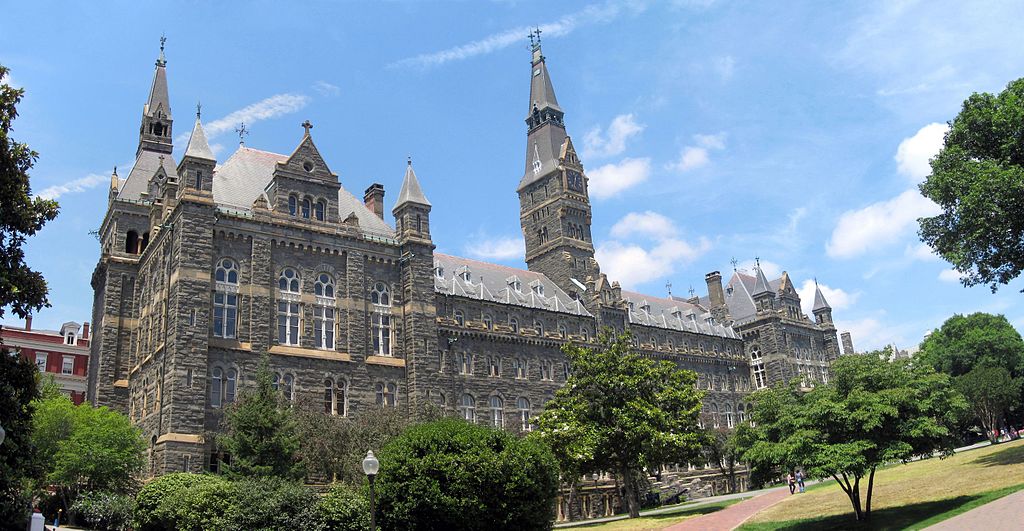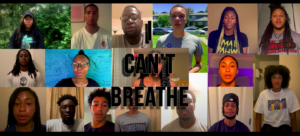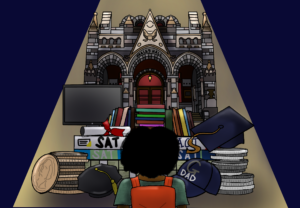A long-accepted part of the college admissions process, legacy admissions, which prioritizes applicants with familial ties to a school, have come under renewed scrutiny for their prioritization of wealthy, predominately white applicants—and students at Georgetown hope to do more than just voice criticisms.
A petition to end legacy admissions for students applying to Georgetown began circulating on July 1. In that time, it has gained over 500 signatures from students, alumni, and faculty calling on the university to end a practice the petition accuses of propagating racial inequality.
“When you consider how racialized admissions is in general, standardized tests, interviews, the whole process has dimensions where socioeconomics status and race can create biases, legacy admissions stood out in particular to Amanda and I as being a significant barrier and particularly Black students in entering our school,” Adam Shaham (SFS ’22), one of the writers of the petition, said.
According to the petition, this call is in reaction to the murder of George Floyd by Minneapolis police officers in May and the subsequent national outcry against systemic racism. Georgetown itself releases multiple statements committing the university to fight against racism and encouraging diversity, which the petition argues should include ending legacy admissions.
“If we at Georgetown hope to make any meaningful change to truly confront racism, we must end this blatantly discriminatory and unfair practice,” the petition reads.” The time for performative action is over.”
Amanda Feldman (SFS ’22), one of the writers of the petition, has held concerns about Georgetown’s legacy admissions for years, but the broader national environment encouraged her to take action.
“We’ve been in the midst of a political reckoning and so I can speak for all of us and say we’ve been more reflective of our own institutions and how they contribute to racial disparities and discrimination,” Feldman said. “I think it’s just kind of a confluence of factors that told me at least that the time is now to do something about this.
At Georgetown, applicants with legacy status are twice as likely as non-legacy applicants to be accepted, and these students, according to a Hoya article in 2017, are more likely to be white and from the East Coast than other applicants.
Iyanah Langa (COL ’22), who joined the authors in advocating for the petition after its creation, pointed out that these admissions are taking place at a campus that is already primarily non-Black.
“Coming from a place that’s very white, I expected to have more diversity in college, and I think the people I know are somehow less diverse,” Langa said, “which is why when I saw their petition it really was important to me because there’s a clear system that’s being perpetuated.”
“It’s clear that there’s a huge divide that favors people who are very wealthy, very white so that was a whole ‘oh wow, I didn’t know coming in that I was an underdog.’”
Nearly three-quarters of the top 100 American colleges and universities practice legacy admissions, generally claiming giving preference to legacy students helps incentivize fundraising and admit students who have a connection to the university. The student body at a selective school like Georgetown is typically made up of 10 to 15 percent legacy students.
However, that wasn’t the original rationale for legacy admissions. The practice began in the 1920s, primarily to exclude Jewish and Catholic applicants, who were unlikely to have legacy status and more likely to be from minority ethnic backgrounds, from America’s top schools.
The petition claims the policy remains discriminatory, regardless of its modern intentions. “If such policies have lost their explicitly racist intentions, they still operate as implicit, structural obstacles of discrimination today,” the petition reads. “It is therefore unsurprising that the vast majority – over 90% – of those who benefit from legacy admissions are white.”
Feldman expressed concern with a policy whose effect was to advantage white students at a campus that already could feel unwelcoming to low-income students of color. Whiteness at Georgetown, according to Feldman, is hard to ignore.
“It’s definitely something I notice right away. I am from Houston, we’re very diverse here,” she said. “So I was very surprised walking into classrooms and being the only Black student, sometimes being the only Black woman.”
Today, while over half of white college students have at least one parent who attended college, only 25 percent of Black students, and about 20 percent of Hispanic, Pacific Islander, or Native American students do.
This disparity that exists from birth feels wrong to Shaham, whose parents are both immigrants who did not attend American universities.
“Just walking into a classroom and knowing other kids had an advantage that no matter how hard I worked, no matter how many things I excelled at, that was never an option for me to be viewed in that way, to be considered that way, and that they had a leg up just from their birth, it was just frustrating,” he said.
A university spokesperson wrote in an email to the Voice that Georgetown reviews applicants without considering their ability to pay, and has chosen not to accept the Common Application to keep the admissions process more personal.
“Georgetown is one of just a few dozen institutions that is not only need-blind but meets the full financial need of every admitted student,” the statement read. “The Georgetown Scholars Program and Community Scholars Program continue helping the university enroll a more racially and socioeconomically diverse student body, including many first-generation students.”
This is not the first time in recent years students at Georgetown have been asked to confront the influence of wealth in the admissions process. A nationwide admissions scandal, nicknamed “Operation Varsity Blues,” implicated the parents of seven Georgetown admits, as well as former Georgetown tennis coach Gordon Ernst in a scheme to secure admission to elite universities by paying for students who had no intention of joining athletic teams to be designated as “recruits,” and more likely to be granted admission. Parents were also accused of paying for their students to take admissions tests with, especially lenient proctors.
The scandal also led many Georgetown students to share the ways in which they felt the normal process of admission benefited the wealthiest students, including legacy status. Response from students to the petition has been overwhelmingly positive, according to the trio. Shaham’s close friend, who is a legacy student, and his mom, an alumna, both signed on, and Langa reported one professor had responded with additional ideas about diversifying the admissions process, such as modeling a George Washington University program that gives D.C. only scholarships.
Other students have reached out to offer suggestions, which Shaham has found encouraging. “This is something the community really wants and is willing to engage with,” he said.
Though they recognize legacy students may have hesitation, Langa said one of her friends who has legacy status feels insecure about their place on campus, suggesting they might feel more at peace if they knew that status wasn’t a factor. Shaham assured he thinks most legacy students are qualified, and the petition isn’t personal.
“I think it becomes very personal to people because school is a tradition,” he said. “And I don’t want to rob anyone of that, right? I don’t want to rob something that is important to your family but I want them to realize how much that family tradition maybe hurts the broader public.”
Shaham and Feldman are waiting for the open letter to reach 1,000 student signatures and 100 faculty signatures before they send it to University President John DeGioia and Dean of Admissions Charles Deacon. In the meantime, they are thinking of other ways wealthy students and white students are prioritized in the admissions process, such as Georgetown’s requirement of SAT II tests.
“There are just a lot of ways that the admissions process is fundamentally biased against low-income people, communities of color, first-gen students, this is obviously something we need but it’s a first step,” Feldman said.






[…] higher education” would be a step towards accessible, equitable education. Last month, students and faculty at Georgetown started signing a petition that calls to end legacy […]
[…] higher training” would be a step against accessible, equitable training. Final month, college students and college at Georgetown began signing a petition that calls to extinguish legacy […]
[…] higher education” would be a step towards accessible, equitable education. Last month, students and faculty at Georgetown started signing a petition that calls to end legacy […]
[…] higher education” would be a step towards accessible, equitable education. Last month, students and faculty at Georgetown started signing a petition that calls to end legacy […]
[…] higher education” would be a step towards accessible, equitable education. Last month, students and faculty at Georgetown started signing a petition that calls to end legacy […]
[…] higher education” would be a step towards accessible, equitable education. Last month, students and faculty at Georgetown started signing a petition that calls to end legacy […]
[…] higher education” would be a step towards accessible, equitable education. Last month, students and faculty at Georgetown started signing a petition that calls to end legacy […]
[…] higher education” would be a step towards accessible, equitable education. Last month, students and faculty at Georgetown started signing a petition that calls to end legacy […]
[…] higher education” would be a step towards accessible, equitable education. Last month, students and faculty at Georgetown started signing a petition that calls to end legacy […]
[…] higher education” would be a step towards accessible, equitable education. Last month, students and faculty at Georgetown started signing a petition that calls to end legacy […]
[…] training” can be a step in direction of accessible, equitable training. Final month, students and faculty at Georgetown started signing a petition that calls to finish legacy […]
[…] perhaps perhaps well be a step in the direction of accessible, equitable training. Closing month, students and college at Georgetown started signing a petition that calls to total legacy […]
[…] American higher education” would be a step towards accessible, equitable education. In July, students and faculty at Georgetown started signing a petition calling for the […]
[…] American higher education” would be a step towards accessible, equitable education. In July, students and faculty at Georgetown started signing a petition calling for the […]
[…] American higher education” would be a step towards accessible, equitable education. In July, students and faculty at Georgetown started signing a petition calling for the […]
[…] American higher education” would be a step towards accessible, equitable education. In July, students and faculty at Georgetown started signing a petition calling for the […]